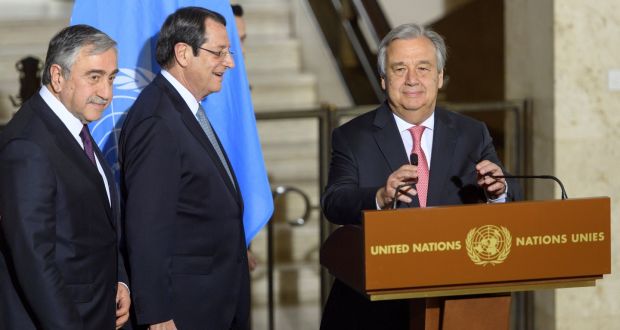
Geneva negotiations -for the first time five-party talks took place since the period of establishing the Republic of Cyprus- are paused until the 18th January.
During such a process where progression is very likely, positive or negative concentration of opinions as well as affections in an environment after Annan Plan (for Cyprus), reach peak.
While the media gives wide publicity to the news in relation to the negotiations, political structures inclined their ears to Geneva.
Inclining their ears are being experienced more than a basic listening, and as a part of political propagandas towards the public.
On one hand, there have been demonstrations arranged to “encourage” negotiators, on the other hand, chauvinists have been increasing the dosage of the “patriotic literature” by the use of social media.
But then, the participation of the financial institutions such as, International Monetary Fund (IMF) and the World Bank at the negotiations as well as the presence of Turkey, Greece and the United Kingdom at the negotiation table becoming visible, prove that the expression of the process “being carried out by the Cypriots” and the agreement to be reached “will be Cypriot” is a fairy-tale.
Well then; the Cyprus problem, which has been present for more than half a century and gets even more complicated by acquiring new dimensions every day, has been discussed in which political framework at this stage?
How are the Turkish Cypriot socialists looking at this process?
The aim of this short article is to touch upon this previously discussed topic once again.
If we start examining the approaches regarding this period which has come to a new point, it is obvious that the so-called right-wing and anti-peace communities are pleased about the process as they take advantage of the system that occurred after 1974 in the north of Cyprus. We see that these communities, if needed, are trying to sabotage the process by the expression of “an independent and sovereign state of TRNC (Turkish Republic of Northern Cyprus)” which is even inconsistent with the expressions of Ankara and which is not believed by anyone anymore. “We are the government, no one is informing us” named nonsense attempt to rise by the representatives of governmental party who have been to Geneva is an example of this perception. From time to time, these communities exploit the acts of the chauvinist communities in the south and are trying to find support for their views.
On the other hand, the majority of pro-peace groups can go no further than apolitical expression of peace by breaking the process off the political context. The same communities are presenting the progress to the public as they desired; to a large extent by making fun of the right-wing and by presenting Cyprus to be purified from all its troubles after a possible agreement. This approach, which comes into being with expressions such as “We will switch to Euro currency and there will be no more troubles to talk about” is not as effective as it needs to be and does not comply with the left-view in fact, is embedding the struggle for peace onto a right-view ground.
Creating an apolitical struggle for peace, these communities are simplifying the Cyprus problem as if it is only a matter of currency unit or merely to be involved in the international law and a lot of aspects of it regarding the peoples of Cyprus are not even discussed.
Apart from being spoken on the streets in this way, representatives of several pro-peace parties and organisations in person are approaching this issue non-politically and are promising a rose-coloured Cyprus where all of the troubles will come to an end with an agreement. This approach is so blind that it cannot recognise which currency thousands of Greek Cypriot youth are using, who have been involved in the international law and who are struggling with unemployment just as their Turkish Cypriot peers in the north.
The problem is not only the law or the currency unit. There are many aspects of the Cyprus problem and particularly socialists have to discuss them.
Otherwise, the issue will come to light to the extent the hegemonies are presenting.
Physical reunification of the island, developing a brotherhood among people, Turkish Cypriots to be involved in the international law, political equality, economic system, elimination of victimisations experienced, the position of imperialism in Cyprus…
These are a few aspects of the Cyprus problem and undoubtedly that, while these have been discussed at the ongoing negotiations, benefits of peoples of Cyprus are not a determining criterion.
For example, particularly the issue of guarantees, which is continuously on the news with an informal and offhand fashion of attitudes from Ankara, has not been discussed for the benefit of peoples of Cyprus. The funds which IMF and the World Bank are said to be supplying are not complimentary either. Perhaps, due to current conditions, benefits of out-of-island bodies cannot be pushed off the table. However, praising the negotiations and the possible plan as much as it deserves, at least because the process has been going on in this way, is a point which socialists will not compensate. A possible agreement whose borders are drawn by the hegemonies has nothing more than opportunities it might create.
These opportunities are related to eliminating 43-year-long isolation of the people by providing a physical reunification. Such a circumstance will create a potential which can provide Turkish Cypriots and Greek Cypriots to get closer from a socio-economic point of view. However, this case is a process which would expect possible novel tension to arise. Even only this probability is a sign that a possible agreement is not saved from the shortages, rather it will create a Cyprus accommodating new political opportunities. Therefore, while evaluating the possible new situation, foremost the peace supporters should embrace this process with objectivity. Neither they should be deterred by the chauvinist and fascist communities against peace, nor should market fiction scenarios to the public by breaking off a possible agreement from its reality. The duty of socialists is to be prepared for tomorrow with a consciousness that there are new responsibilities in every new situation and this preparation is not to be focused on the negotiations on the TV, rather to politically organise the life.
Writer: Ali Sahin
Translated by: G. I.
Original article (in Turkish): http://www.ankaradegillefkosa.org/yeni-kosullar-yeni-gorevler-ali-sahin/


